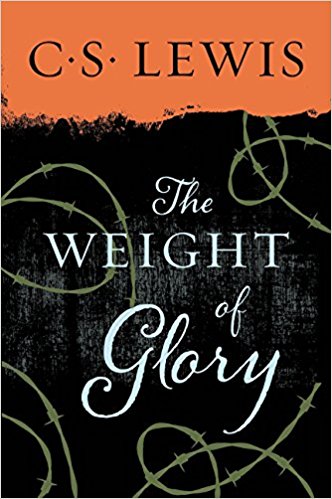One of my favorite passages of Scripture…a encouragement towards steadfastness that is unlike anything else that I’ve read or heard…is found in 2 Corinthians 4:17-18, “For this light momentary affliction is preparing for us an eternal weight of glory beyond all comparison, as we look not to the things that are seen but to the things that are unseen. For the things that are seen are transient, but the things that are unseen are eternal.” (ESV) Ever since reading that passage several years ago, my heart and mind have been consumed with that idea of “The Weight of Glory.” Everyone wants the glory, but no one willingly signs up for the suffering.
I just finished rereading C.S. Lewis’s The Weight of Glory and was reminded what a privilege it is to be considered worthy as a child of God to approach the throne of grace with confidence (Hebrews 4:16) to share our deepest struggles and concerns with the very Creator of the universe. He wants to know our deepest hurts and He desires nothing more than to show us His perfect glory which outshines any bump in the road…or even all the mountaintops of celebration that we might encounter in our journey on this earth.
I highlighted several things while reading and have posted those notes below. Soli Deo Gloria!
- In his beautiful peroration at the end of his sermon “The Weight of Glory,” C.S. Lewis, after commenting o the immortality of the human soul, says, “This does not mean that we are to be perpetually solemn. We must play. But our merriment must be of that kind (and it is, in fact, the merriest kind) which exists between people who have, from the outset, taken each other seriously.” p. 1
- It would seem that Our Lord finds our desires not too strong, but too weak. We are half-hearted creatures, fooling about with drink and sex and ambition when infinite joy is offered us, like an ignorant child who wants to go on making mud pies in a slum because he cannot imagine what is meant by the offer of a holiday at the sea. We are far too easily pleased. p. 16
- If a transtemporal, transfinite good is our real destiny, then any other good on which our desire fixes must be in some degree fallacious, must bear at best only a symbolical relation to what will truly satisfy. p. 29
- Glory, as Christianity teaches me to hope for it, turns out to satisfy my original desire and indeed to reveal and element in that desire which I had not noticed. By ceasing for a moment to consider my own wants I have begun to learn better what I really wanted. p. 39
- We live, in fact, in a world starved for solitude, silence, and private: and therefore starved for meditation and true friendship.
- There are no ordinary people. You have never talked to a mere mortal. Nations, cultures, arts, civilizations – these are mortal, and their life is to ours as the life of a gnat. But it is immortals whom we joke with, work with, marry, snub and exploit – immortal horrors or everlasting splendors. This does not mean that we are to be perpetually solemn. We must play. But our merriment must be of that kind (and it is, in fact, the merriest kind) which exists between people who have, from the outset, taken each other seriously – no flippancy, no superiority, no presumption. p. 46
- A university is a society for the pursuit of learning. p. 47
- Happy work is best done by the man who takes his long-term plans somewhat lightly and works from moment to moment “as to the Lord.” p. 61
- I believe in Christianity as I believe that the Sun has risen, not only because I see it, but because by it I see everything else. p. 140

